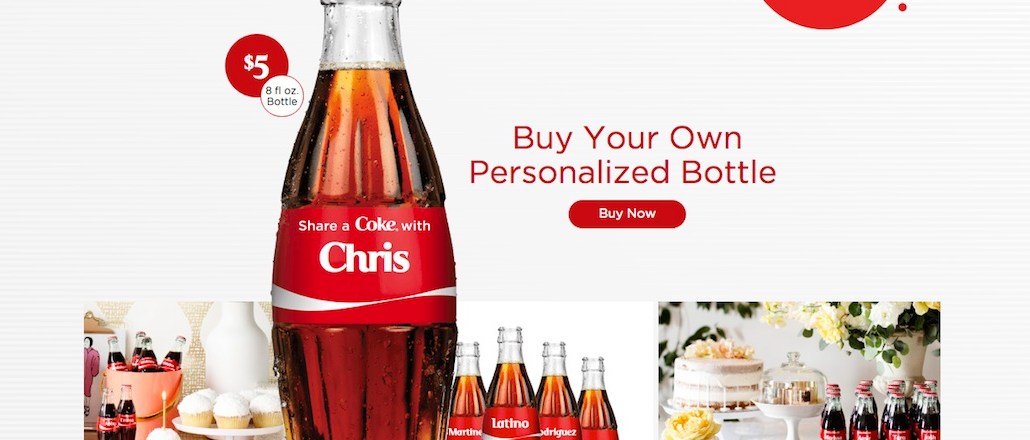Secure your place at the Digiday Media Buying Summit in Nashville, March 2-4

Coca-Cola may have created one of the more recognizable global campaigns in recent years with “Share a Coke,” but not everyone is drinking the sugar water.
The campaign lets fans of the soft drink customize their own bottle labels by submitting a word, name or phrase to the “Share a Coke” site. The Center for Science in the Public Interest, a health advocacy group, recently got the better of the gimmick by creating a bottle with the words “Share a Coke with Obesity” emblazoned across it — before the word was eventually banned.
The label was created by Mike Howard, chief executive of Boston design company Daughters and Howard, who set out to have a little bit of fun by seeing which words he could slip past Coca-Cola’s vetting process. The “Share a Coke” website states that orders must not contain any “objectionable” material, including words which are deemed libelous, defamatory, pornographic, sexually explicit, unlawful, racially or ethnically offensive. It further states that anything which it considers harassing, abusive, threatening, harmful, vulgar, profane, obscene, or violent will not be allowed.
While “obesity” was somehow approved for Howard, Coca-Cola subsequently banned the word. The whole experience was then crystallized in this video:
“We’ve been working to reduce soda consumption for a number of years now — besides pushing for various policies, like taxes, warning labels, and prohibitions on soda in schools, we’ve tried to reposition Coke, and soda generally,” Jeff Cronin, director of communications at the Center for Science in the Public Interest, told Digiday. “Coke isn’t a source of happiness, it’s disease-promoting sugar water.”
To be sure, this isn’t the first time a brand has seen its customizable campaign go awry. In 2001, Jonah Peretti (who would later co-found Huffington Post and BuzzFeed) made national headlines when he hacked a Nike campaign. He managed to get a pair of running shoes with the word “Sweatshop” splashed across them.
This protest effort comes on the heels of recent reports which say that Coca-Cola has teamed up with influential scientists to promote the argument that weight-conscious Americans are overly fixated on how much they eat and drink while not paying enough attention to exercise. The beverage conglomerate also faced another PR crisis recently, when a Jamie Oliver documentary on Channel 4 blamed Coke for Type 2 diabetes in Mexico being a leading cause of death. Coke responded with an ad campaign in newspapers highlighting its range of sugar free alternatives.
Alex Bogusky, co-founder and former exec of ad agency Crispin Porter + Bogusky and Howard’s friend, also tweeted his support, by posting a picture of a Coke bottle branded with the word “obesity,” saying that Coke had “shut” his friend down. Bogusky has also been closely involved in other anti-Coke campaigns that the Center for Science in the Public Interest has done in the past. (Bogusky, of course, made his name with work for Burger King and Domino’s, but subsequently had a change of heart.)
One of them was a recent spoof of Coke’s “Hilltop” ad, which reemerged in public conscience when it was used as part of the plotline of the “Mad Men” finale in May.
Happiness is … truth on a Coke bottle. My buddy made this on https://t.co/F0EmgXnqsT but now they shut him down. : ( pic.twitter.com/Q1x56WSJEE
— Alex Bogusky (@bogusky) September 4, 2015
“From an actionability perspective, it’s an interesting way to see Coke’s response,” Howard told Digiday. “I was surprised that they initially permitted it, it would have been perceived as a really positive move by them had they not gone back on it.”
“It’s unfortunate that CSPI and others deliberately try to turn a fun experience into something negative to further their attacks on our brand,” said a company spokesperson when Digiday reached out to Coca-Cola for comment.
More in Marketing

Digiday+ Research: Brand marketing will be the priority in 2026, after revenues fell short of expectations
Revenues fell short of marketers’ expectations in 2025. But they’ll be working with bigger budgets in 2026, and focusing on brand marketing.

ChatGPT enters the ad game. Now what?
OpenAI has begun testing ads in ChatGPT through premium brand partnerships, signaling a new phase in its monetization strategy.

Ad Tech Briefing: A mid-term report card
Despite earnings increases, stock prices are down demonstrating how the public markets are a cruel place.





